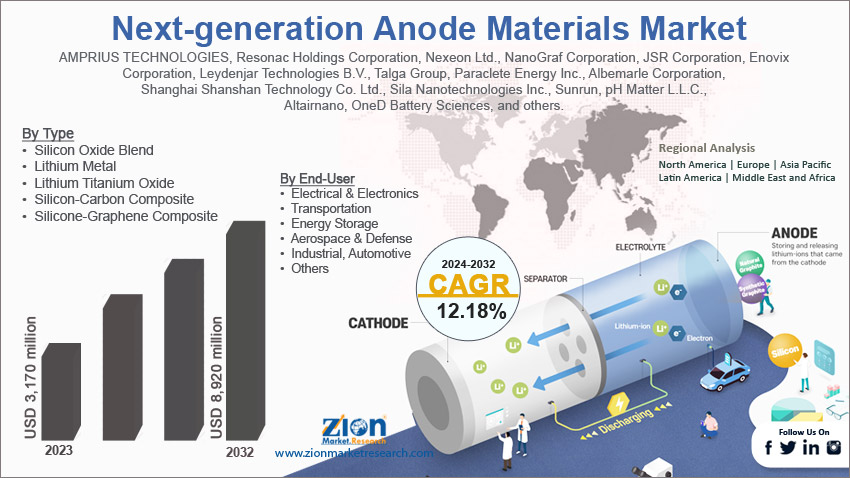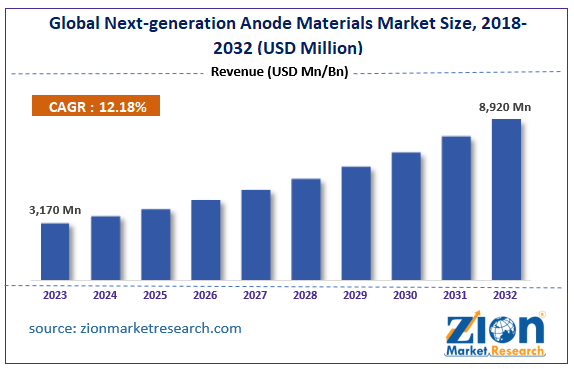Next-generation Anode Materials Market Size, Share, Growth, Trends, and Forecast, 2032

Next-generation Anode Materials Market By Type (Silicon Oxide Blend, Lithium Metal, Lithium Titanium Oxide, Silicon-Carbon Composite, and Silicone-Graphene Composite), By End-User (Electrical & Electronics, Transportation, Energy Storage, Aerospace & Defense, Industrial, Automotive, and Others), and By Region - Global and Regional Industry Overview, Market Intelligence, Comprehensive Analysis, Historical Data, and Forecasts 2024 - 2032
| Market Size in 2023 | Market Forecast in 2032 | CAGR (in %) | Base Year |
|---|---|---|---|
| USD 3,170 million | USD 8,920 million | 12.18% | 2023 |
Next-generation Anode Materials Industry Prospective:
The global next-generation anode materials market size was evaluated at $3,170 million in 2023 and is slated to hit $8,920 million by the end of 2032 with a CAGR of nearly 12.18% between 2024 and 2032.
Next-generation Anode Materials Market: Overview
Next-generation anode materials are referred to as advanced materials that are created for use in power storage and conversion systems. The key aim of using these products is to improve battery performance and fuel cell performance as well as the performance of various electrochemical devices. For the record, in lithium-ion batteries, anode materials are negative electrodes operating with cathode materials.
Key Insights
- As per the analysis shared by our research analyst, the global next-generation anode materials market is projected to expand annually at the annual growth rate of around 12.18% over the forecast timespan (2024-2032)
- In terms of revenue, the global next-generation anode materials market size was evaluated at nearly $3,170 million in 2023 and is expected to reach $8,920 million by 2032.
- The global next-generation anode materials market is anticipated to grow rapidly over the forecast timeline owing to technological breakthroughs that have led to the development of new anode materials having higher energy densities and elongated life.
- In terms of type, the silicone-graphene segment is slated to register the highest CAGR over the forecast period.
- Based on end-users, the aerospace & defense segment is predicted to contribute majorly towards the global industry share in the upcoming years.
- Region-wise, the Asia-Pacific next-generation anode materials industry is projected to register the fastest CAGR during the projected timespan.
 Request Free Sample
Request Free Sample
Next-generation Anode Materials Market: Growth Factors
A rise in the sale of electric cars owing to growing renewable energy trends to spearhead the global market expansion by 2032
The surging sale of electric vehicles owing to the need to reduce fuel emissions is likely to translate into huge demand for next-generation anode materials, thereby steering the growth of the global next-generation anode materials market. Technological breakthroughs have led to the development of new anode materials having higher energy densities and elongated life. This is likely to provide impetus to the growth of the global market. Rising renewable energy trends will scale up the demand for next-generation anode materials.
Next-generation Anode Materials Market: Restraints
Surging manufacturing prices to restrict the expansion of the global industry over forecast timeline
Law scalability and rising production costs can hinder the expansion of the global next-generation anode materials industry. A rise in the raw component prices can impede the expansion of the global industry. Low production of high-quality graphene to put brakes on the global industry expansion.
Next-generation Anode Materials Market: Opportunities
Escalating use of lightweight components can open new growth avenues for the global market
Growing demand for high energy density, lightweight, and extended lifespan will open new growth opportunities for the global next-generation anode materials industry.
Next-generation Anode Materials Market: Challenges
Stringent government regulations can challenge the expansion of the global industry over an assessment period
Strict government laws related to the use of the product along with the rise in import and export duties are predicted to challenge the growth of the global next-generation anode materials industry.
Next-generation Anode Materials Market: Segmentation
The global next-generation anode materials market is divided into type, end-user, and region.
In type terms, the next-generation anode materials market across the globe is bifurcated into silicon oxide blend, lithium metal, lithium titanium oxide, silicon-carbon composite, and silicone-graphene composite segments. Additionally, the silicone-graphene segment, which acquired nearly 68% of the global market revenue in 2023, is expected to record the fastest annual rate of growth in the forecast timeline. The expansion of the segment in the next eight years can be due to a rise in the use of products in a slew of end-use sectors such as electrical & electronics, transportation, energy storage, aerospace & defense, industrial, automotive, and others.
Based on the end-user, the global next-generation anode materials industry is divided into transportation, electrical & electronics, automotive, energy storage, aerospace & defense, industrial, and others segments. Moreover, the aerospace & defense segment, which garnered about 66% of the global industry revenue in 2023, is projected to make sizable contributions towards the global industry share over the analysis timespan. The growth of the segment in the ensuing years can be attributed to a rise in the demand for products in the aerospace & defense segment.
Next-generation Anode Materials Market: Report Scope
| Report Attributes | Report Details |
|---|---|
| Report Name | Next-generation Anode Materials Market |
| Market Size in 2023 | USD 3,170 Million |
| Market Forecast in 2032 | USD 8,920 Million |
| Growth Rate | CAGR of 12.18% |
| Number of Pages | 219 |
| Key Companies Covered | AMPRIUS TECHNOLOGIES, Resonac Holdings Corporation, Nexeon Ltd., NanoGraf Corporation, JSR Corporation, Enovix Corporation, Leydenjar Technologies B.V., Talga Group, Paraclete Energy Inc., Albemarle Corporation, Shanghai Shanshan Technology Co. Ltd., Sila Nanotechnologies Inc., Sunrun, pH Matter L.L.C., Altairnano, OneD Battery Sciences, and others. |
| Segments Covered | By Type, By End-User, and By Region |
| Regions Covered | North America, Europe, Asia Pacific (APAC), Latin America, Middle East, and Africa (MEA) |
| Base Year | 2023 |
| Historical Year | 2018 to 2022 |
| Forecast Year | 2024 - 2032 |
| Customization Scope | Avail customized purchase options to meet your exact research needs. Request For Customization |
Next-generation Anode Materials Market: Regional Insights
North America is expected to maintain its leadership status in the global market in the next couple of years
North America, which contributed approximately 67% of the global next-generation anode materials market earnings in 2023, is projected to maintain the number one position in the global market in the years ahead. In addition to this, the regional market expansion in the next couple of years can be due to escalating awareness among consumers about the benefits offered by next-generation anode materials. In addition to this, the presence of key manufacturers in countries such as Canada and the U.S. will prop up the regional market expansion.
Asia-Pacific's next-generation anode materials industry is predicted to record the fastest growth rate in the forecast timespan. The rapid progression of the industry in the sub-continent over 2024-2032 can be credited to massive product demand in various end-user sectors in countries such as China, Japan, Taiwan, and South Korea.
Key Developments
- In the second half of 2021, JSR Corporation, a precision technology firm, launched a new research & development unit referred to as JSR Bioscience & informatics to expand the production activities of their life science business.
- In the third quarter of 2023, Panasonic Energy Company Limited signed an agreement with Nexeon Limited to acquire silicon anode material for automotive batteries to enhance the efficacy of lithium-ion batteries for electric vehicles.
Next-generation Anode Materials Market: Competitive Space
The global next-generation anode materials market profiles key players such as:
- AMPRIUS TECHNOLOGIES
- Resonac Holdings Corporation
- Nexeon Ltd.
- NanoGraf Corporation
- JSR Corporation
- Enovix Corporation
- Leydenjar Technologies B.V.
- Talga Group
- Paraclete Energy Inc.
- Albemarle Corporation
- Shanghai Shanshan Technology Co. Ltd.
- Sila Nanotechnologies Inc.
- Sunrun
- pH Matter L.L.C.
- Altairnano
- OneD Battery Sciences
The global next-generation anode materials market is segmented as follows:
By Type
- Silicon Oxide Blend
- Lithium Metal
- Lithium Titanium Oxide
- Silicon-Carbon Composite
- Silicone-Graphene Composite
By End-User
- Electrical & Electronics
- Transportation
- Energy Storage
- Aerospace & Defense
- Industrial, Automotive
- Others
By Region
- North America
- The U.S.
- Canada
- Europe
- France
- The UK
- Spain
- Germany
- Italy
- Rest of Europe
- Asia Pacific
- China
- Japan
- India
- South Korea
- Southeast Asia
- Rest of Asia Pacific
- Latin America
- Brazil
- Mexico
- Rest of Latin America
- Middle East & Africa
- GCC
- South Africa
- Rest of Middle East & Africa
Table Of Content
Methodology
FrequentlyAsked Questions
Next-generation anode materials are referred to as advanced materials that are created for using in power storage and conversion systems.
The global next-generation anode materials market growth over forecast period can be owing to technological breakthroughs has led to development of new anode materials having higher energy densities and elongated life.
According to a study, the global next-generation anode materials industry size was $3,170 million in 2023 and is projected to reach $8,920 million by the end of 2032.
The global next-generation anode materials market is anticipated to record a CAGR of nearly 12.18% from 2024 to 2032.
The Asia-Pacific next-generation anode materials industry is set to register the fastest CAGR over the forecasting timeline owing to massive product demand in various end-user sectors in the countries such as China, Japan, Taiwan, and South Korea.
The global next-generation anode materials market is led by players such as AMPRIUS TECHNOLOGIES, Resonac Holdings Corporation, Nexeon Ltd., NanoGraf Corporation, JSR Corporation, Enovix Corporation, Leydenjar Technologies B.V., Talga Group, Paraclete Energy, Inc., Albemarle Corporation, Shanghai Shanshan Technology Co., Ltd., Sila Nanotechnologies Inc., Sunrun, pH Matter L.L.C., Altairnano, and OneD Battery Sciences.
The global next-generation anode materials market report covers the geographical market along with a comprehensive competitive landscape analysis. It also includes cash flow analysis, profit ratio analysis, market basket analysis, market attractiveness analysis, sentiment analysis, PESTEL analysis, trend analysis, SWOT analysis, trade area analysis, demand & supply analysis, Porter’s five force analysis, and value chain analysis.
Choose License Type
HappyClients
Zion Market Research
Tel: +1 (302) 444-0166
USA/Canada Toll Free No.+1 (855) 465-4651
3rd Floor,
Mrunal Paradise, Opp Maharaja Hotel,
Pimple Gurav, Pune 411061,
Maharashtra, India
Phone No +91 7768 006 007, +91 7768 006 008
US OFFICE NO +1 (302) 444-0166
US/CAN TOLL FREE +1 (855) 465-4651
Email: sales@zionmarketresearch.com
We have secured system to process your transaction.
Our support available to help you 24 hours a day, five days a week.
Monday - Friday: 9AM - 6PM
Saturday - Sunday: Closed






